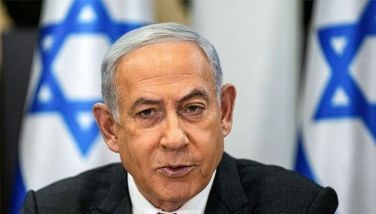Al-Qaeda claims deadly prison raids in Iraq
BAGHDAD — Al-Qaeda's branch in Iraq claimed responsibility yesterday for audacious raids on two high-security prisons on the outskirts of Baghdad this week that killed dozens and set free hundreds of inmates, including some of its followers.
The statement from the Islamic State of Iraq and the Levant, the Al-Qaeda affiliate in Iraq, was posted on an online jihadist forum. It said months of planning went into the highly coordinated assaults on the prisons in Abu Ghraib and Taji that began late Sunday.
The attacks, among the most stunning in Iraq since a surge in violence began in April, have drawn sharp criticism from opposition lawmakers and ordinary Iraqis over government efforts to keep the country safe. The spike in bloodshed is intensifying fears of a return to the widespread sectarian killing that pushed the country to the brink of civil war after the 2003 US-led invasion.
In its statement, Al-Qaeda in Iraq said the prison operation involved 12 car bombs, military-style barrages of rockets and mortars, suicide bombers and help from prisoners who had managed to obtain weapons on the inside.
Iraqi officials have said at least 25 members of the Iraqi security forces were killed in the attacks, along with at least 21 prisoners and 10 militants.
Al-Qaeda boasted that its men killed more than 120 government forces, and claimed that on its side, only the suicide bombers died in clashes that raged for hours.
Frank Finver, a spokesman for the American Embassy in Baghdad, said the US is "deeply concerned" by the attacks and the overall levels of violence in Iraq.
He said the US is in ongoing contact with the government of Iraq to help improve its ability to weaken or defeat Al-Qaeda inside Iraq, but he gave no specific details on counter-terrorism cooperation.
Iraq's central government has not provided a clear account of what happened or said how many prisoners escaped Sunday night.
The Interior Ministry has said several prisoners broke out from Abu Ghraib, the infamous prison in Baghdad's western suburbs that was the site of well-publicized prisoner abuse at the hands of the US military following the 2003 invasion.
But several Iraqi officials, including members of parliament's security and defense committee, have said more than 500 inmates escaped. Both prisons house thousands of inmates, including convicted Al-Qaeda militants, though it appears no one broke out of the Taji prison.
Al-Qaeda said in its statement that the attack freed hundreds of detainees, including more than 500 mujahedeen, or holy warriors.
The authenticity of the statement could not be independently confirmed. It was posted on a website commonly used by jihadists and its style was consistent with earlier Al-Qaeda statements.
The prison break could help bolster Al-Qaeda's ranks and give them a propaganda boost.
"Al-Qaeda needs as much resources as it can get, including manpower," said Paul Floyd, who served several tours in Iraq with the US Army and is now a military analyst at global intelligence company Stratfor. "The larger the operation, the more successful it is, the more likely they are to claim it."
Prime Minister Nouri al-Maliki voiced disappointment over the handling of the Abu Ghraib attack in brief comments during a broader discussion aired on state television.
"I have imposed harsh punishments on some people in relation to Abu Ghraib," he said, without elaborating.
In the statement, Al-Qaeda also claimed responsibility for other unspecified attacks over the past four months in response to a heavy-handed crackdown by security forces on a Sunni protest camp in the northern town of Hawija on April 23.
The Hawija raid killed 44 civilians and one member of the security forces, according to estimates by the United Nations. It followed months of rallies by Iraq's minority Sunnis against the Shiite-led government over what they contend is second-class treatment and the unfair use of tough anti-terrorism measures against their sect.
Violence in Iraq has spiked to the highest level in half a decade in the wake of the Hawija crackdown. More than 3,000 people have been killed since the start of April, including more than 500 since the start of July.
Iraqi security forces have struggled to quell the violence, angering many Iraqis. The prison attacks have only increased the sense of insecurity.
"What happened in Abu Ghraib is a mixture of obvious security shortcomings, incompetence, complicity (and) inefficiency," said Baghdad-based political analyst Hadi Jalo. "The top commanders — including officers, ministers and officials — and the Iraqi government share the blame."
The bloodshed continued into yesterday.
Insurgents bombed a local government building in the village of al-Rashad, outside the ethically disputed northern city of Kirkuk. The attackers kidnapped two anti-Al-Qaeda Sunni militiamen who were guarding the building and later shot them dead, said al-Rashad mayor Louis al-Fandi.
A bomb later exploded outside a Sunni mosque in Kirkuk, wounding seven, police Col. Taha Salaheddin said.
Police also found the bodies of four off-duty policemen on a road about 30 kilometers (20 miles) north of the city of Mosul. The policemen, who were on leave and heading home, were killed with bullets to the head, according to authorities.
In Mosul itself, gunmen in a speeding car shot dead two other off-duty policemen as they were walking in a street, police said. Three sheep traders were shot dead in the northern city later in the day.
Morgue officials confirmed the Mosul deaths. The officials who provided details of the attacks spoke on condition of anonymity because they weren't authorized to talk to the media.
- Latest
- Trending

































